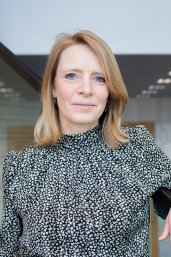Major DNA changes important in colorectal cancer
Breakthrough in cancer research thanks to AI
A multidisciplinary research team led by Utrecht professor Sanne Abeln has used AI technology to discover that large changes in the DNA of cancer cells are just as important as small changes. This insight could lead to more effective treatments for the disease. Abeln will deliver her inaugural lecture on March 8th.

Cancer cells make many mistakes when they divide compared to healthy cells. Some of these mistakes, or mutations, affect the course of the disease, but it is difficult to determine which ones. Sanne Abeln, professor of AI Technology for Life, discovered together with Soufyan Lakbir of the VU and Remond Fijneman of the Netherlands Cancer Institute that large changes in the genome - the complete genetic material of an organism - have just as much impact on the course of the disease as small mutations.
Until now, it was assumed that small changes in DNA - point mutations - had a major influence on how cancer develops. There is already specific medication that treats such mutations. Abeln and her colleagues discovered that in various forms of cancer, such as colorectal cancer, large changes in specific genes are just as important as point mutations.
Breakthrough
The discovery is a breakthrough, because it was previously difficult to determine how important a large change in the genome was. Now the researchers succeeded by using a new AI tool to look at gene expression data. Gene expression data shows which genes are active in a cell. By studying the change in active genes in detail, the researchers were able to determine which mutations are important.
Abeln: “With AI, we tried to predict a change in the genome based on gene expression data. This worked for some genes and not for others. That gave us information: apparently only the genes for which we could develop a predictive model have to do with a change in gene expression and therefore for tumor development.” By using this smart trick with the data, the researchers were able to take into account the effect of all these genes at the same time, which was not previously possible.
Apparently only the genes for which we could develop a predictive model have to do with tumor development
Abeln: “Only mutations in specific genes can tell us something about the properties of a cancer cell. The information about these crucial genes involved in cancer can therefore contribute to a better treatment of the disease.” However, before a change in the genome can be included in a new study on the effect of specific medication, that change must first be properly mapped out. The latter can be done much more easily with this new technique, according to Abeln.
The discovery was made possible thanks to a multidisciplinary collaboration with the VU and the Netherlands Cancer Institute. “Soufyan and I developed the method, but thanks to Remond Fijneman and his expertise in the field of molecular biology, we were able to make it relevant for colon cancer research. The credit for this breakthrough therefore also goes to them, with a key role for the PhD student Soufyan Lakbir.”
International Women’s Day
Abeln will deliver her inaugural lecture on Friday, March 8th, International Women’s Day. The professor will also focus on women in science, or rather: the lack of them, in her speech. “The academic path is not ideal for women. I see it in the young generation of female researchers I supervise: these women are very good at their work, but still do not choose a postdoc position. When you are in your early thirties, a research career brings too much uncertainty, more than for young men.”
In her own group, Abeln is committed to a diverse team. “What I notice is that in departments that are dominated by men, the pure competitive motivation is more present than in departments that are more diverse. In a more diverse team, the motivations are also different: not only focused on performance but also on cooperation and solving problems together. I think both motivations need to be there.”
In addition, Abeln sees that women less often choose a study like Computer Science, because they prefer to choose a direction where they can do something for someone else, instead of a study choice for something that you enjoy or are good at. Abeln: “I find that worrying, because that perspective is so badly needed. Working with large amounts of data is a delicate field, where the human aspect is sometimes lost sight of - especially at the large tech companies.”
Publicatie
The study by Sanne Abeln and her colleagues has not yet been published. It can be read in preprint with this link. The software of the AI tool is also available online.
The inaugural speech will take place March 8th at 16.15 and can be followed via livestream.

